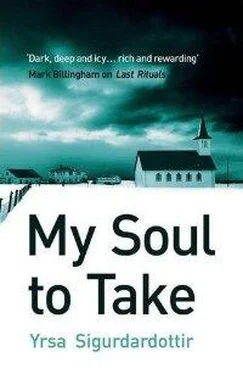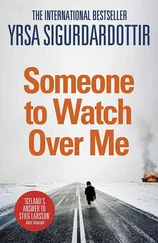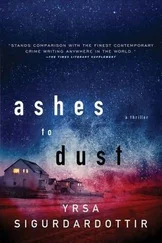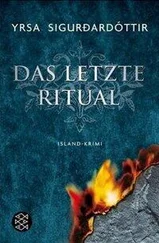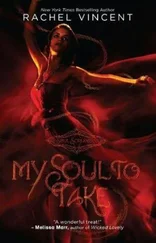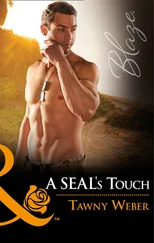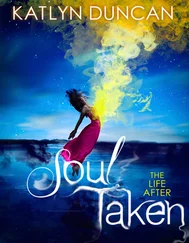“You must try to send the ghost baby back to its mother,” Matthew persisted. “That’s what you’re meant to do . . .”
Thóra couldn’t wait to get out of the reception area . A scorched smell hung about the place from the charred carcasses that had been carried through the building. She would have liked to pinch her nose as she went past Vigdís, but decided to just hold her breath and keep walking. As she hurried past, she bumped into Thröstur Laufeyjarson.
“Oh, sorry,” she said, trying to regain her balance. “I didn’t see you.”
“That’s all right,” said the canoeist grumpily. He was wearing a wet suit, his hair wet. “No harm done—shame I can’t say the same for my canoe,” he added.
“Oh?” asked Thóra. “Has it been damaged?” When she saw Thröstur’s fierce expression, she involuntarily blurted, “I haven’t touched it.”
“No, I know,” said Thröstur, continuing on his way.
“Hang on, I wanted to ask you something,” said Thóra, grabbing his arm. She was startled to realize how muscular he was. “I’ve been trying to find you, but you’re hard to get hold of.”
“What do you want to ask?” he said. She let go of his arm, not wanting to push her luck. “Whether I’ve ever got stuck with my head underwater when I’ve been out in the canoe?”
“Er, no,” replied Thóra, baffled. “That had never occurred to me. No, my question is about the two murders that have been committed here. You must have heard about them.”
Thröstur’s expression was a strange mixture of irritation and apprehension. The hotel doors opened and he caught sight of the pile of bones that was being carried past. “What’s going on there?”
“Quite a lot,” said Thóra. “None of it good. Have you got time to talk? It could be important.” She hoped the sight of the bones would sway him.
“Yes, all right,” he replied abruptly. “I was on my way to talk to the police, anyway. Since my canoe’s damaged, there’s no reason to keep quiet anymore.”
“About what?” asked Thóra, directing him to a table outside. They sat down, and Thóra introduced Matthew. “What were you going to tell the police?”
Thröstur looked grave. “On Friday morning, I went out to train and found my canoe all covered in blood.” He checked himself. “Well, not exactly covered. There was blood on the paddle and the seat, and splashes here and there. It wasn’t my blood, and I assumed it must have something to do with the murder committed on Thursday evening.”
Thóra stared at him. “It’s Tuesday today,” she said. “Why on earth haven’t you said anything before?”
“I didn’t know anything about the murder until Saturday, when some woman in reception told me, and I’d cleaned most of it off by then,” said Thröstur impatiently.
“So there’s still some blood left?” asked Thóra hopefully. Perhaps the murderer’s fingerprints could be preserved.
“Er, no, there isn’t,” muttered Thröstur sheepishly, adding by way of mitigation, “I’m due to compete in the world championships in two weeks’ time. I couldn’t have my canoe being taken off to some lab, so I cleaned the rest off and decided to keep my mouth shut. The damage had been done, because I’d already removed most of the blood.”
Thóra didn’t envy him; he’d have to confess all to Thórólfur. “But what made you change your mind?” she asked.
“Whatever idiot did it must have run the canoe up on to some rocks and damaged the bottom. I couldn’t understand why my times were so bad, but I only just noticed the damage. The bottom was fine when I checked it last week, so it’s that bloody killer who’s caused me all this trouble.” He leaned back and crossed his arms. “The police may as well take the canoe. I won’t be able to compete now.”
Clearly what upset Thröstur most about the case was that the murderer had damaged his canoe.
“I’m not sure you understand,” said Thóra, “that if you’d come forward with the information about the canoe at once, on Saturday, it might have been possible to prevent the murder that took place on Sunday evening.”
“Hardly!” Thröstur argued. “There wasn’t much blood left—I told you.” He looked to Matthew for support, then tried to change the subject. “I’m definitely going to sue the murderer when he’s discovered and get compensation for the damage. I was on course for a medal.”
“It’s a tragedy,” said Thóra, striving unsuccessfully to keep the sarcasm out of her voice. “One more question. You drove through the Hvalfjördur Tunnel on Sunday evening, didn’t you?”
“Yes,” snapped Thröstur. “I ran out of my protein supplement and I had to get to a decent pharmacy.” He glared defiantly at Thóra. “Don’t you believe me? I’ve got the receipt, from a pharmacy in the city.”
“What? Oh, yes,” said Thóra absently. She was thinking of something else: the fact that they could no longer rule out the people who had been at the séance, or any hotel staff who were in the vicinity. “How long does it take to paddle from here out to the inlet where the architect was killed?” she asked.
“No time at all,” he replied. “It’s a very short distance by sea. You don’t have to follow all the twists and turns of the overland route. It would take me about five minutes if the sea was calm. Someone not used to a canoe might take ten minutes.”
“Can a first-timer paddle one fairly easily?” asked Matthew, who until then had just been listening.
“Yes, unless they’re really inept,” said Thröstur. “You need practice to paddle a canoe well, but to go from A to B in calm water you don’t need any expertise, just strength.” He stood up. “I’d better take a shower before I go and see the police. I want my case taken seriously because I’m not kidding about this.” He pushed the heavy wooden chair up to the table and turned away. Then he suddenly recalled something and turned back. “Also, that lad in the car is sure to remember me,” he said. “He should be easy enough to trace.”
“What lad? Who do you mean?” asked Thóra.
“When I drove out of the tunnel toward Reykjavík, I saw a car stopped at the side of the road. I thought it had broken down. I pulled over to offer the driver a lift, but it was a terribly disfigured boy, who said he wasn’t going anywhere, that he was just going to sit in the car for a bit and everything was fine. Then he wound up his window and refused to speak to me.”
“What time was this?” asked Matthew.
“About six, I think,” replied Thröstur. “He was gone when I got back later that evening. He probably got fed up with reassuring people that he was okay. I can’t have been the only one who thought he’d broken down. Another car was pulling up as I left,” he added, then turned and went into the hotel.
Matthew nudged Thóra’s leg under the table. “I think Steini followed Berta through the tunnel to make sure she was definitely gone, then pulled over and watched her drive away before turning back to finish off Eiríkur. Thröstur must have turned up while he was waiting. It all fits.”
“It’s a bit tenuous,” said Thóra. “If he was at the tunnel at six, he still had to drive all the way up here, which is a fair distance.”
“We don’t know Eiríkur’s time of death with any accuracy,” said Matthew. “They said ‘dinnertime.’ People eat their dinners at all sorts of times.” He stood up. “I’m just going to get the list. I want to see when he drove south. I wasn’t looking for that when I found his name.”
Thóra couldn’t bear the idea of going through the reeking lobby again, so she decided to wait outside. Matthew soon came hurrying back with the sheaf of papers. “He went through the tunnel toward Reykjavík five cars after Berta. It all fits my theory. He must have wanted to be sure she was gone.” He slapped the papers down on the table in front of Thóra. “I think we have to speak to her, in case she knows something that may complete the jigsaw.”
Читать дальше
